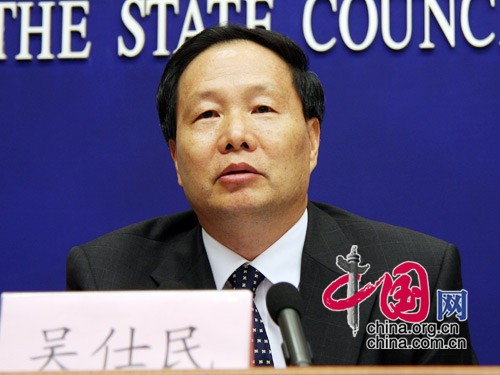The government stressed that its ethnic autonomy policies are "effective", but that "improvements might be made when necessary".
Officials and experts said there is room to revise the policies in some ethnic regions.
"The current policies include guiding principles set by the central government and regulations of local governments, but a deeper understanding is needed when it comes to making policies at the local level," Wu Shimin, vice-minister of the State Ethnic Affairs Commission, said yesterday at a press conference at the State Council Information Office in Beijing.

Authorities will not abandon the policies, despite the July 5 riot in Urumqi, capital of the Xinjiang Uygur autonomous region, Wu said, because "separatists, not police" caused the riot.
Wu said the State's ethnic policy "had nothing to do with the violent crimes" in Urumqi. The riot left 197 Uygurs and Han Chinese dead.
Wu's comments were not the first since the riot occurred. Authorities have said there is a need to better implement the country's ethnic regional autonomy.
On April 20, an editorial in the People's Daily called on officials to "uphold and improve" the 55-year-old policy regarding the nation's 110-million minority population.
The policy has allowed minority groups to enjoy self-government rights, from legislation to ethnic language use to natural resources exploration.
In many cases, preferential policies on educational and social welfare are also available for ethnic populations.
Some experts have said the failure to implement the policy among ethnic groups in some regions has caused some minority groups to be upset.
Barry Sautman, an expert on China's ethnic policies at the Hong Kong University of Science and Technology, said issues faced by the Xinjiang authorities might include economic and population disparities among ethnic groups and local regulations that may affect religious practices.
The Chinese government should address these issues, Sautman told China Daily via e-mail.
The ethnic affairs commission yesterday said national laws forbid religious activities in schools and there are no statistics yet on income disparity between Han Chinese and Uygurs in Xinjiang.
Local governments must put equality first among all ethnic issues when they seek "multiethnic unification and prosperity", a political aim set by the central government, said Professor Yang Jianxin, director of the ethnic studies center at Gansu-based Lanzhou University.
Huang Ming, headmaster of a school with about 200 Uygur students learning both Mandarin and Uygur languages, told China Daily that his school "encouraged, not forced", Uygur students to speak Mandarin.
Shi Yugang, head of policies, laws and regulations with the ethnic affairs commission, declined to say whether there are implementation problems.
"It is never the central government's aim to let the Han Chinese take control of the ethnic region. It is the national policy to encourage an equal chance of exchanges between cultures, religions, languages, even marriages," he told China Daily.
Allipu Abdulti, at 38 the youngest Uygur official in Hetian prefecture in the Uygur-dominated region in southern Xinjiang, said it is important to reach mutual trust between the government and residents.
"The government appointed Uygur officials like me to create barrier-free channels for fellow Uygur residents," said Allipu.
Yang said: "Officials should abandon old-fashioned thinking and respect ethnic groups. No pressure should be imposed on any ethnic groups. This has been what China has been doing since ancient times."
(China Daily July 22, 2009)